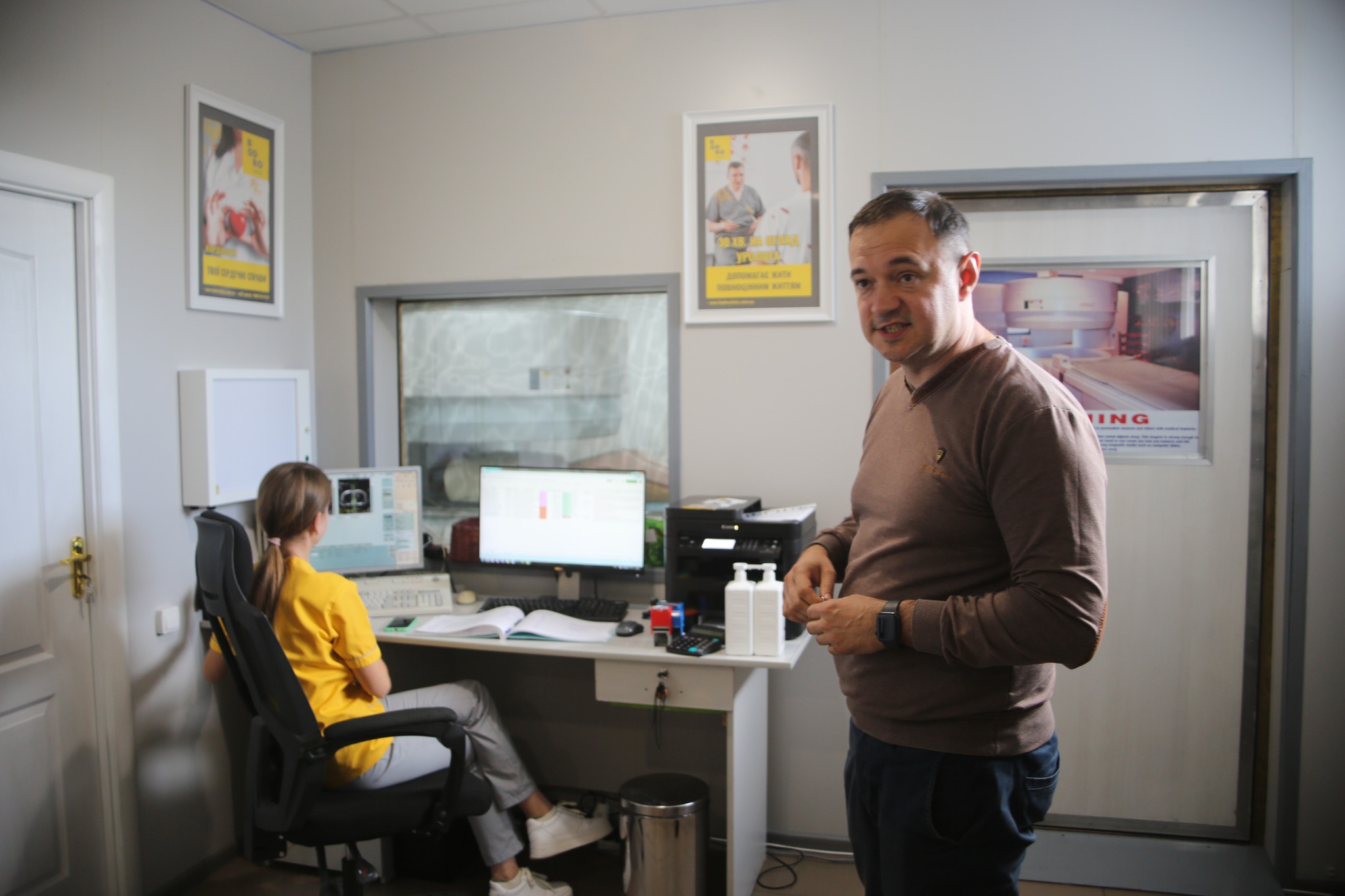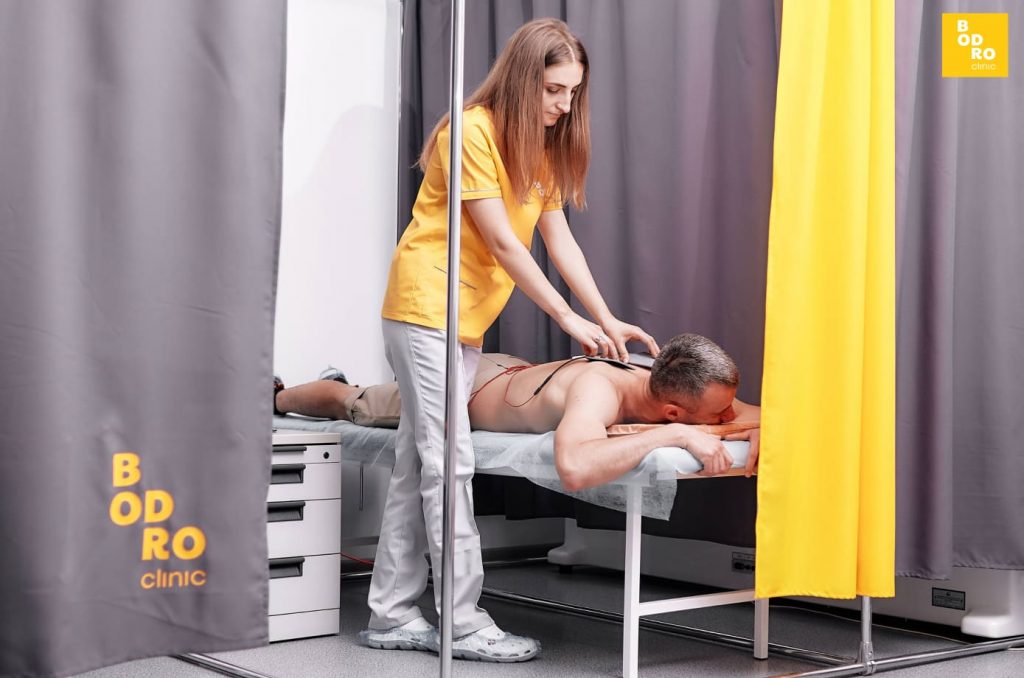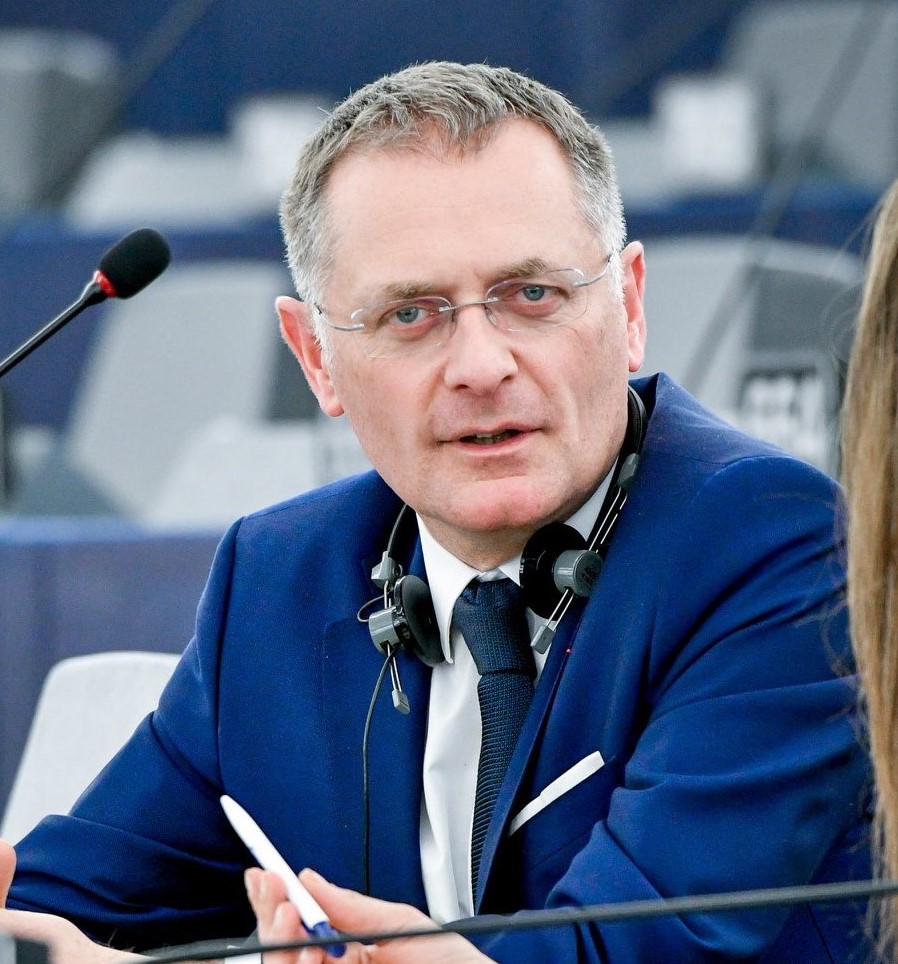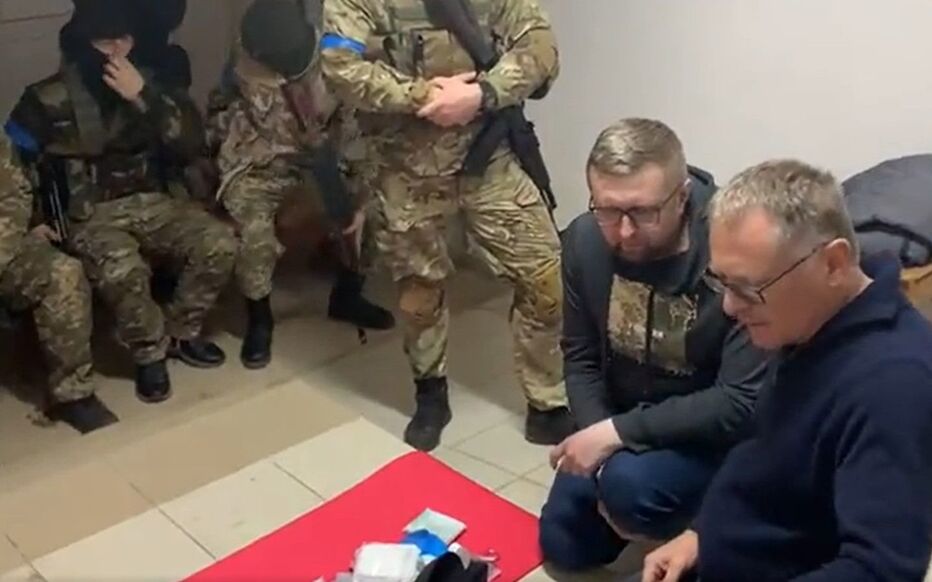- Part 1: The Novovolynsk miracle: how Russia’s invasion turned a Ukrainian mining town into an uber-volunteer hub
- Part 2: Businesses fleeing war to west Ukraine find a new life and help the army
- Part 3: Ambitious wartime story of Bodro clinic’s survival and growth
- Part 4: (coming soon)
- Video: Town that volunteers for Ukraine’s victory
Bodro is an exceptional medical clinic for a small town with fewer than 50,000 residents. That’s thanks to the clinic’s founder, Serhiy Kryzhanovskyy, who, in his last year of high school, was inspired to think big by modern Ukrainian poet Lina Kostenko’s poem, Life goes on without proofreading.
“This poem inspired me to enroll in medical school and then to change something, to leave something behind,” Serhiy says.
Later, after reading about the Mayo Clinic in the small city of Rochester, Minnesota, he set a goal of establishing a top-notch clinic. Now, Bodro clinic, in Novovolynsk, offers a polyclinic, surgery, rehabilitation, and leading-edge pain diagnosis. Ultrasound machines are in almost every doctor’s cabinet, along with MRI, reanimation, and physiotherapy. The clinic is fitted with solar panels on the roof, hotel rooms for visitors, and innovative “tours for health” programs that combine preventive health checkups and local tourism for any taste.
‘I feel a sense of mission, even though I’m not fighting,’ owner of Bodro clinic
As soon as the war began, all businesses had to decide whether to continue operating as usual in the face of risks and threats. The Bodro clinic determined it had sufficient resources for three months of salaries and expenses.
“We decided to work and see. If we earn money, there will be salaries. If we don’t, there won’t be any,” says Serhiy of the decision made by the doctors in the early days after the full-scale invasion.
With that decision, Bodro announced online that it would definitely continue working. Fortunately, only one doctor had left the clinic to go abroad.
The clinic provides proactive assistance to the military. It has raised funds for tourniquets and other medical equipment, organized professional training with a top French doctor, employed Ukrainian doctors who fled areas in or near the war zone, and treated injured soldiers.
I did not understand how one can attack a prepared country’
Serhiy says that he did not seriously consider the risk of all-out war until the attack on 24 February 2022.
“From a logical standpoint, I did not understand at all how one can attack a country whose army is prepared for a full-scale attack. I told everyone that it was simply unbelievable and a form of stupidity. However, this stupidity happened,” Serhiy says.
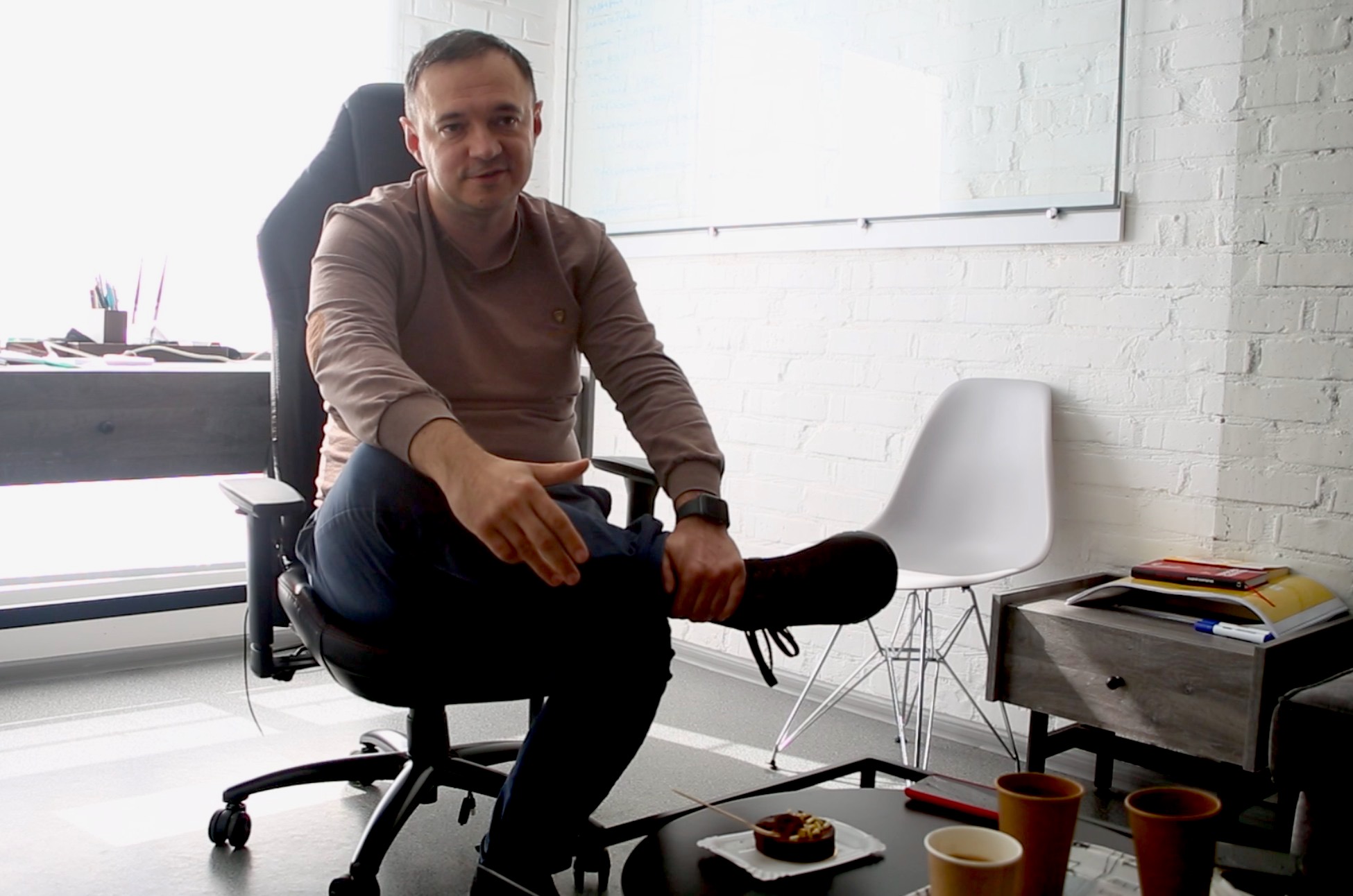
On February 23, the Bodro clinic was undergoing the final phase of its X-ray licensing. “I can’t think of anything more difficult in the world than getting an X-ray license in Ukraine,” Serhiy says, adding that it took him two and a half years, but he was able to complete it just before the outbreak of war. Then, after a 5 a.m. call the following morning, he glanced out the window and saw a column of refueling Ukrainian tanks and armored personnel carriers.
On the first or second day of the war, the clinic was still receiving visitors. According to Serhiy, some of those who arrived in the initial hours of the attack had no idea that the war had begun. Prior to the arrival of the refugees from Kyiv and Kharkiv, the number of clients had dropped sharply, only to then have the number of visitors rise again.
From France to Malaysia: help arrives from international friends
In addition to maintaining the regular operations of the clinic, Serhiy informed his international contacts that their help might be required. First, he contacted his Malaysian friend telling him that tourniquets for the military were desperately needed. Together, they started a project to collect 100,000 tourniquets and they very quickly got the first 400. Later, the rate of delivery slowed. “Still, Malaysia is far away; they don’t understand our war very well, so the money is now being collected more slowly,” Serhiy adds.
Additionally, Serhiy contacted his French acquaintances, and within a week, humanitarian aid containing highly specialized medical supplies arrived in Ukraine. In particular, two field hospitals were packed into two military containers.
Moreover, a doctor, professor, and politician from France, Philippe Juvin, also came to Bodro clinic to help. He served as a member of the European Parliament for two terms, worked as a surgeon in Afghanistan during the war, and later dealt with the aftermath of terrorist attacks in Paris. Serhiy recalls that Juvin helped as both a doctor and a politician. “With us, he communicated with President Macron and reached out to one wounded person whom he wished to help,” Serhiy says.
Initially, Juvin intended to work as an anesthesiologist in Ukraine, given that he is a practicing anesthesiologist at the Pompidou Clinic in Paris and teaches at the University of Paris. However, Serhiy offered him a different role:
“I told him, Philip, it doesn’t make much sense for you to work as an anesthesiologist here, even if you’ll be close to the front line. However, your expertise is important to us, and your experience of working with military operations, as you went through Afghanistan and coordinated the emergency service actions. It is also important that you can help, not only in Ukraine, but also when you return to France. I spoke openly because there is nothing to hide here. We want France to assist Ukraine. When Juvin returned to France, he wrote a great article about Ukraine in Le Figaro.”
Together, they identified the four medical issues emerging from the war in Ukraine. Those included:
- paramedicine, the stage of military personnel evacuation;
- the organization of assistance in emergency circumstances, such as mass destruction;
- highly specialized services required for reconstructive surgery and prosthetics;
- and lastly, rehabilitation.
Juvin presented seven recommendations for military personnel on how to aid the wounded on the battlefield. Serhiy then suggested scaling this up and that a video be made. Serhiy asserts that lectures on hospital preparedness in the event of mass destruction were particularly useful.
Rehabilitation of soldiers: ‘We alleviated his pain’
Bodro clinic specializes in the rehabilitation of wounded soldiers who have suffered joint and spine injuries, strokes, or Parkinson’s disease. “Now that the military has appeared [as patients], we have gained valuable experience of working with contusions. We can spend some of our resources. But it still won’t be sufficient to assist everyone. I have already informed our division that we are willing to accept two soldiers per month for free, with the remainder being covered.”
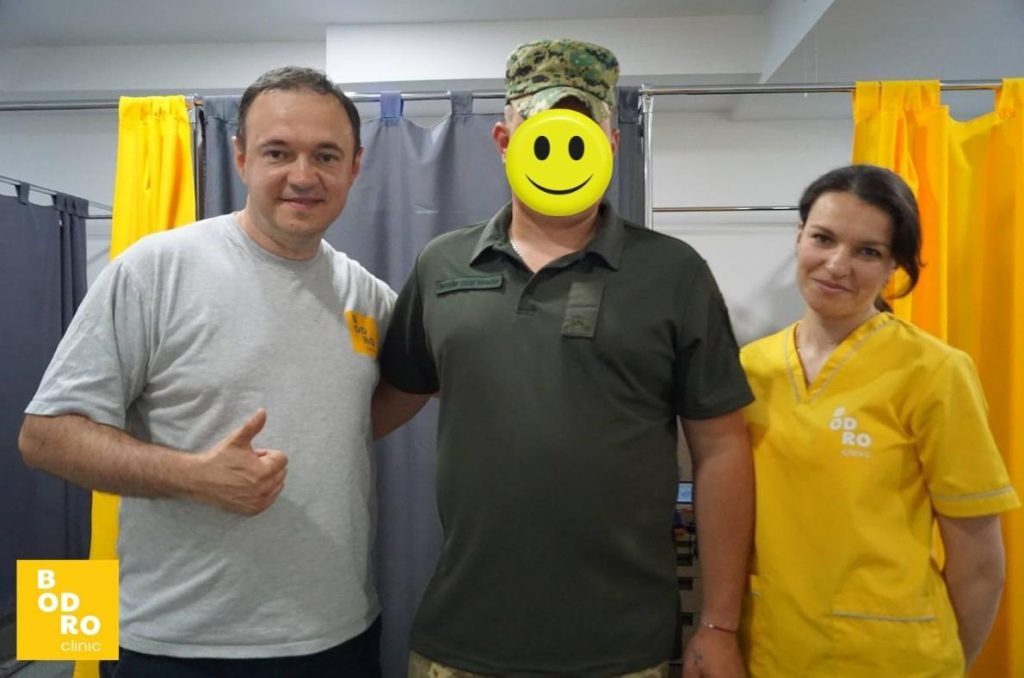
For instance, Bodro clinic assisted a soldier with a sciatic nerve injury who had already been hospitalized for 40 days. He was a Georgian soldier in the Ukrainian army who had been switched to narcotic analgesics to alleviate pain.
“He was prone to a medical addiction,” Serhiy says. “And we alleviated his pain and he will definitely not be on narcotic painkillers. It was a cluster injury, very difficult, and there is still much work to be done, but he is already smiling. It is encouraging.”
Bodro clinic cooperates with the Charity Hero Fund and gradually raises funds for the rehabilitation of soldiers. The main goal is to procure the best equipment to aid the Ukrainian military. “Since there are not as many wars now, it has not been used before, but it should yield good results,” Serhiy says.
Among those currently employed by Bodro, are seven doctors who fled the war-torn east of Ukraine. The clinic hired them from Mariupol, Kharkiv, Kramatorsk, Zaporizhzhia, and Kherson. “We took them in with their families, helped them find housing, integrate, and did everything possible to make them feel at home here,” Serhiy says.
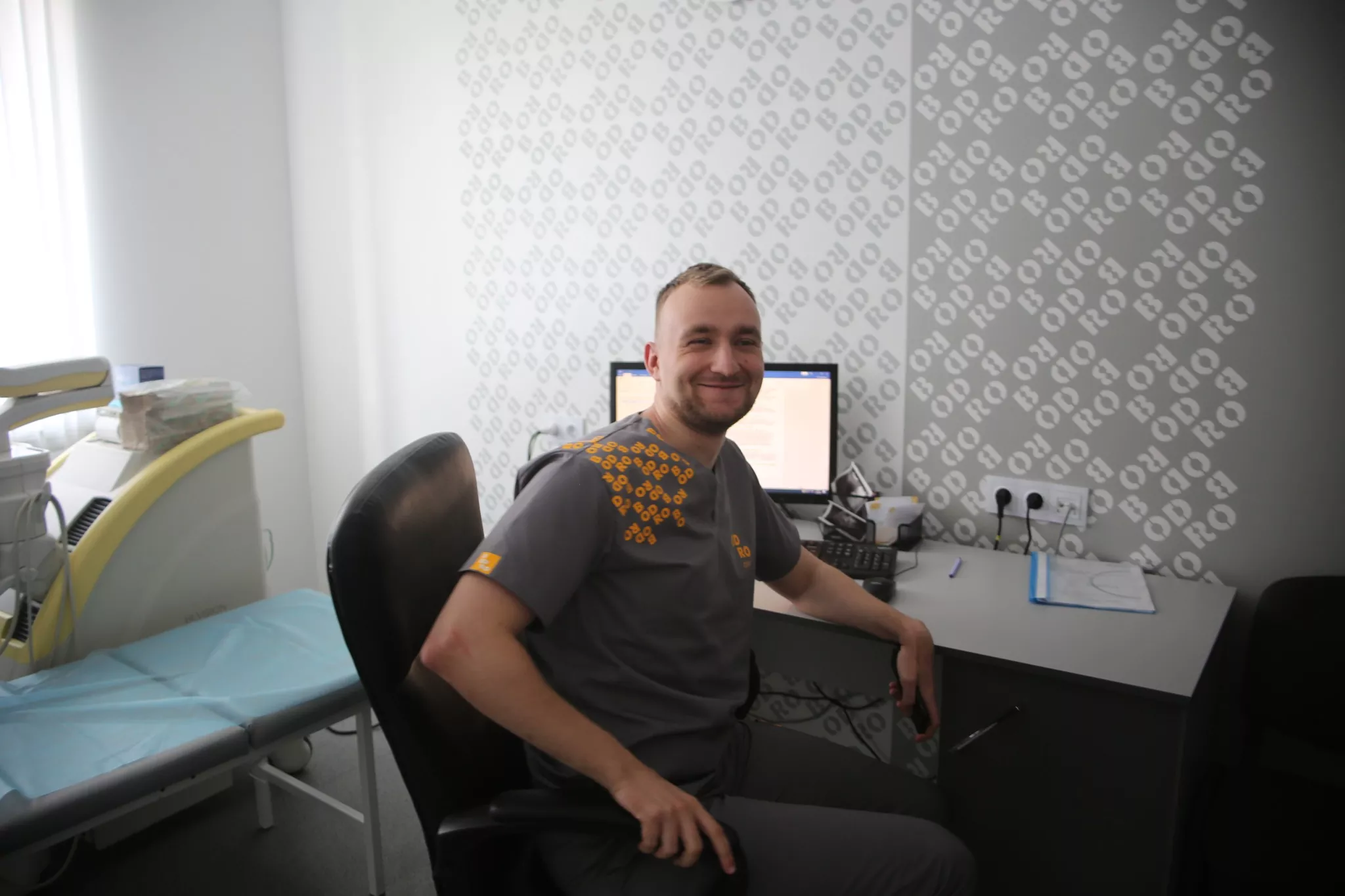
“I feel a sense of my mission in this, because I am not fighting,” Serhiy explains. “And hence, I feel a certain amount of guilt, especially when you see that your friends are either fighting somewhere or doing something more vigorously than you. I think that everyone often feels this way. And then you wonder, what can I do? Maybe I can at least help the resettled doctors. This is one of the missions because we don’t make any profit from them yet.”
Serhiy says that the city’s businesses also help the military, although he has not seen them release this information to the public. Serhiy offers some individual examples. In the early days, his friend’s foundry made anti-tank hedgehogs from its own metal. A car service repairs military vehicles and vehicles procured by volunteers for free.
Another of Serhiy’s acquaintances in the real estate business routinely brings materiel from abroad and sends it to the front. Novovolynsk businesses collaborate on a common chat platform to raise funds for the military.
“Volunteering is cool, but it’s equally important to keep working,” Serhiy concludes.
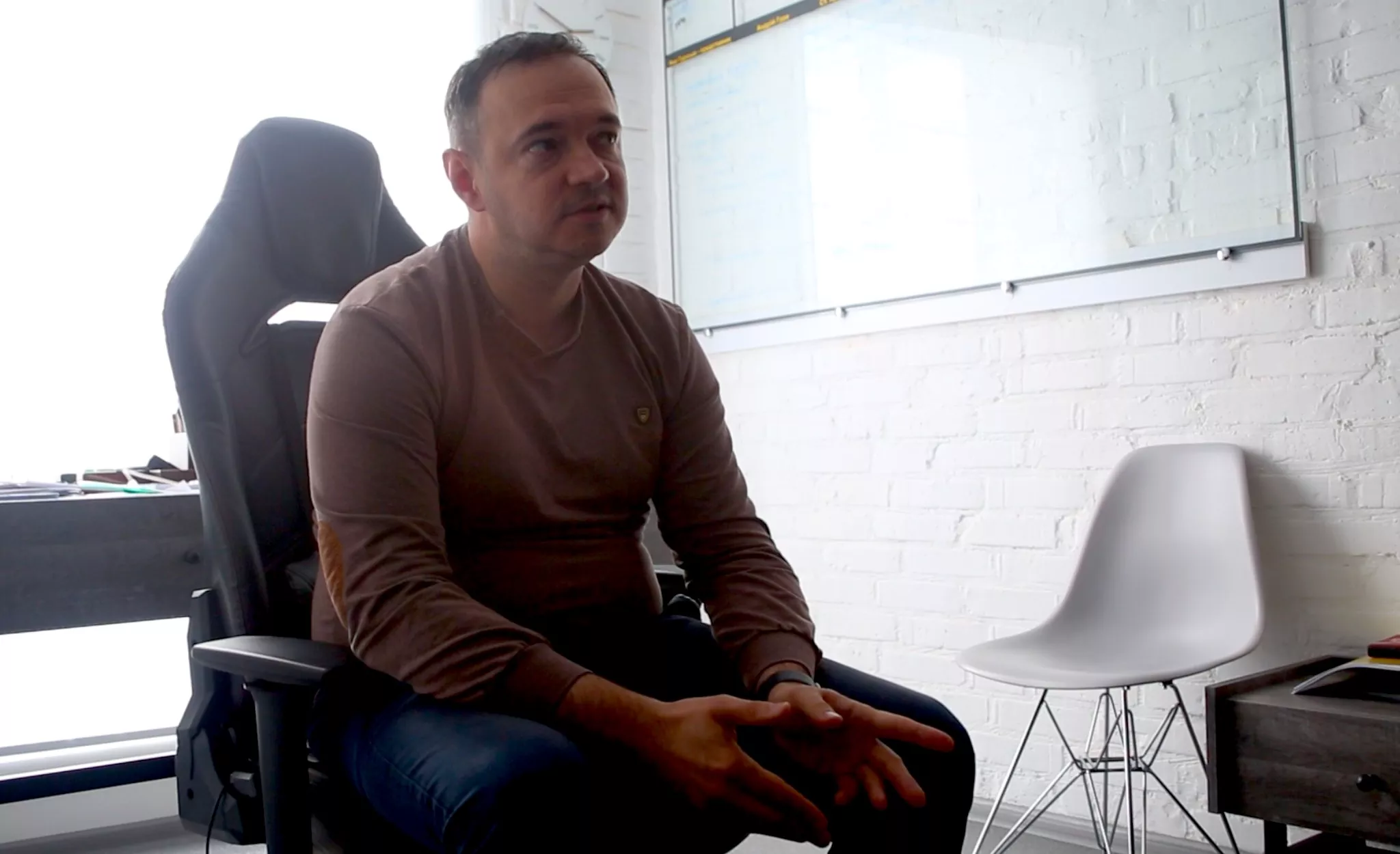
Despite the challenges – Serhiy’s second clinic, located closer to the front line in Pavlohrad, Dnipropetrovsk Oblast, was empty in the early days of the war – Serhiy remains committed to his mission to develop the clinic in Novovolynsk so that even patients from Kyiv will come to this small town for treatment.
Bodro clinic’s story: ‘I don’t have to go to some kind of Kyiv or Lviv. I can be in cool Novovolynsk and set up a clinic here …’
In 2008, Serhiy and his wife wanted to buy an apartment, but the cost of the apartments made them decide that it would be more sensible to save the money and move to Novovolynsk. Serhiy then worked in the pharmaceutical industry and in public health. He read a book about the Mayo Clinic in Rochester, Minnesota, one of the world’s leading teaching and research hospitals. “It was neither in New York, nor in Los Angeles, but in (the) small city of Rochester with a population of 3,900, and this was after the clinic opened,” Serhiy says. The world’s renowned physician, Sir Alexander Fleming, who won the Nobel Prize for the discovery of penicillin, worked there.
“This encouraged me that I don’t have to go to some kind of Kyiv or Lviv. I can be in cool Novovolynsk and set up a clinic here, attracting clients from Kyiv and Lviv. This was my goal and we are making steady progress toward it,” Serhiy says.
“Of course, like everyone else, I have some commercial interests. But my main interest is when I see the satisfaction that comes from completing a successful project. Because an unhealthy obsession with money actually keeps one from working. It is uncommon for a bad person to be a good doctor.”
Related:
- Whoever could, fled the Russians. We went back to Irpin to save the rest
- “The route to life.” How volunteers secretly rescued 75,000 from a city encircled by Russian troops
- Created in three days, Ukraine’s territorial defense ruined Russian plans to capture Kyiv
- How the fanciest pizzeria of Chernihiv fed 22,000 daily under Russia’s siege
- Ukraine’s secret to resisting Russia: resilience
- Lviv Garrison Church chaplains help soldiers find God amid war. And a pair of good boots
- Man saved 1,000 people from hunger during the Russian siege of Chernihiv
- Ukrainian theology professor turned sniper tells how to hunt for Russian invaders
- No place like home. Meet the Ukrainians living in the ruins of their houses destroyed by Russia
- From retiree to millionaire: 7 stories of heroism during the war in…


